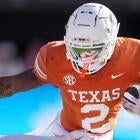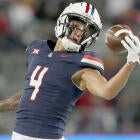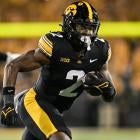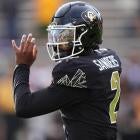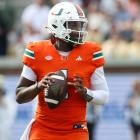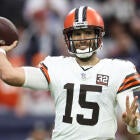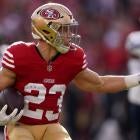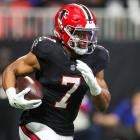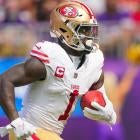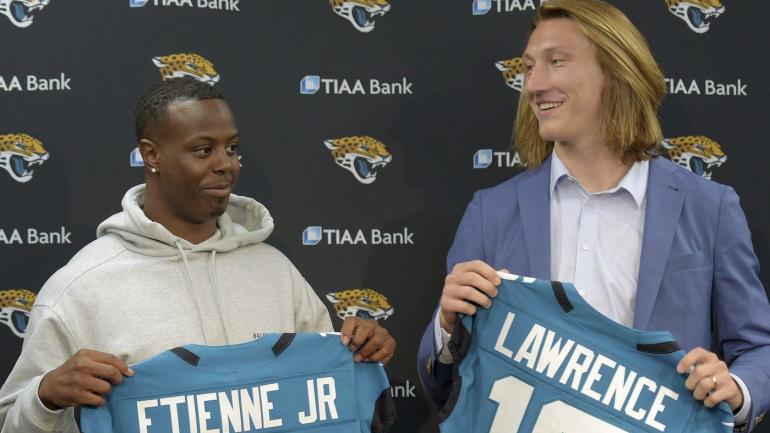
Hey FFT fans, we had a special treat for everyone on Tuesday evening. At 7 p.m. on Tuesday night, we went live on our YouTube channel to answer all of your questions. If you missed it, don't worry! You can watch the recording of the live post-draft live stream here. Also, head over to our YouTube channel linked above, click the subscribe button and set up notifications so you can be notified when we go live next. We'll be doing this throughout the offseason and into the regular season with live streams to answer your questions and record live episodes of Fantasy Football Today with Jamey Eisenberg, Dave Richard, Heath Cummings, and myself chatting every week. You can also check out every episode of FFT on YouTube every day!
Okay, enough promotions, let's get to today's newsletter. Rookie minicamps and voluntary offseason workout programs are going on around the league, and while there isn't much going on -- no contact, limited on-field work -- we're getting our first trickles of information about how the biggest stars of the rookie class figure to be used. I've got the latest noteworthy tidbits from around the league first up, and then I'm taking a look at a specific class of running backs you may want to avoid on Draft Day: Projected workhorses who just aren't actually all that good.
Dave, Jamey, and Adam talked about those kinds of backs on Tuesday's episode of FFT, and you can listen to that here to get their thoughts.
For mine, scroll down. But first, how about some of our first real news in a while:
News and Notes

- Trevor Lawrence will not be a full participant in minicamp -- Lawrence is recovering from shoulder surgery back in February, but is expected to be a full participant come training camp. This is something to keep an eye on, but it doesn't seem like there's much reason to be concerned, especially since it's his non-throwing shoulder.
- Andy Dalton is the starting QB for now -- When the Bears open minicamps, Dalton will get first crack at the first-team offense. And maybe he'll look good enough that they don't really need to even look at rookie Justin Fields … but that seems pretty unlikely. Dalton is fine, but he's not the answer at QB for the Bears, and I'm not sure they're so good that they just need a placeholder at the position. Dalton can be that, but Fields could be a legitimate difference maker. Every Fantasy player should be hoping Fields shows a spark very early on and ends up the starting quarterback because he's the much more intriguing option.
- The Broncos are not naming a starter at QB -- This is actually kind of surprising. Not that I think Drew Lock is much better than Teddy Bridgewater, but I didn't really take this to be any kind of open competition. And maybe it isn't -- maybe this is all just an extended ploy to push Lock to step his game up. Lock's willingness to take risks makes him the higher-upside player for the Broncos' offense, so I'll be pulling for him to take the step up. But the nice thing is, if he doesn't, Bridgewater is a nice safe option, giving Courtland Sutton, Jerry Jeudy, and Noah Fant a higher floor. This offense could explode in 2021, but even a steadier hand on the wheel would be a nice improvement.
- Travis Etienne is working primarily at WR in rookie minicamp -- In theory, this could actually be a really good thing for Etienne, who definitely has some Alvin Kamara-lite potential if he gets a big enough role. However, taken in concert with Urban Meyer's earlier statements that Etienne is viewed as more of the third-down back, it's hard to know exactly what to make of this. Meyer had a lot of success with Percy Harvin as a hybrid WR/RB, and Etienne has similar game-breaking ability with the ball in his hands, so getting him open in space wouldn't be a bad thing. But the Jaguars already have a guy in Laviska Shenault who could thrive in that kind of role too. Etienne could stand out in this offense, but it's also easy to see how he could get lost. It'll be worth watching his usage throughout the summer very closely because he could be a league-winning player if things break right.
- Najee Harris is getting reps at WR too -- The Steelers love to keep their primary running back on the field for nearly every snap if they are up for it, and that often meant in the Le'Veon Bell era that Bell would line up out wide in five-receiver sets. Are they envisioning a similar role for Harris? Given his draft stock, you've gotta think so. Of course, there's a difference between doing that with a still-in-his-prime Ben Roethlisberger behind an elite offensive line and what Harris has to work with, but he should be the No. 1 rookie RB taken in all re-draft leagues because he's got top-five upside.
- The Falcons are having an open competition at RB -- this might be simple coach speak -- RB coach Desmond Kitchings said "the door is wide open" for playing time and the starting spot. Mike Davis is the favorite to take that job, but Qadree Ollison has a chance, as does undrafted rookie Javian Hawkins. Davis is an intriguing option if you're waiting for your second RB, but there's no guarantee he ends up with the role you're hoping for.
- The Eagles claimed Kerryon Johnson -- I don't think this really matters much, because Johnson couldn't even push 35-year-old Adrian Peterson for playing time last season. The Eagles could cut him before the season starts and pay nothing, so it's worth getting a look at a guy who was a pretty intriguing prospect before knee injuries wrecked his career. However, it's a long shot that he'll take significant time from Miles Sanders.
- Kadarius Toney worked primarily out of the slot -- that's in the first few practice sessions. No real surprise here, as Toney profiles as a dynamic short-area target with the ball in his hands. The more interesting thing we'll be looking for as the Giants work Toney is how creative they want to get with his usage. If he's just a slot receiver, that'll be pretty boring, so I want to see him lining up all over the formation come training camp.
- Zach Ertz did not report to voluntary offseason workouts -- the Eagles have given Ertz permission to seek a trade, and so we shouldn't expect to see him with the Eagles unless something changes significantly. Ertz could still be a No. 1 Fantasy TE if he lands in the right place, and his departure would make Dallas Goedert a solid mid-round pick as the fifth, sixth, or seventh TE off the board.
- The Giants signed Kelvin Benjamin to play tight end -- Benjamin entered the NFL at 6'5", 240 pounds with a 4.61 40-yard dash, which isn't far off from what George Kittle, T.J. Hockenson, or Ertz are listed at. Which is to say, he's kind of always been more of a tight end, than anything else. He's still just 30, so maybe Benjamin can have a second career as a tight end, but we would need to see pretty glowing reports out of camp before buying in.
- The Jaguars signed Tim Tebow to play tight end -- Tebow will be 34 years old when the season starts and hasn't played football since 2012. I'm not going to actually take the possibility of him emerging as a viable Fantasy-relevant player seriously until I have a compelling reason to do so. I'm a little embarrassed I had to write this, even.
Workhorse RB, or a trap?

On Tuesday's episode of the FFT, Adam, Jamey, and Dave talked about some of the projected workhorse running backs who aren't actually that good, and how we should approach them for Fantasy. You could look at it two ways: On the one hand, the fact that most assume these players aren't particularly talented means they could be undervalued; on the other hand, if your main case in favor of drafting a player is volume, then they're on pretty thin ice when it comes to remaining relevant.
Of course, first we've got to define what that player archetype looks like. One way you could look at this is to simply look at who is projected for the lowest Fantasy points per touch average. These will be, by definition, the most touch-dependent RB in the league. Based on my projections, here's who I have as the least efficient projected No. 1 RB in 2021:
- Damien Harris (and Sony Michel) - 0.62 PPR points per touch
- Leonard Fournette (and Ronald Jones) - 0.75
- David Montgomery - 0.76
- Josh Jacobs - 0.77
- Derrick Henry - 0.78
- Myles Gaskin - 0.79
- James Conner - 0.797
- JK Dobbins - 0.82
- Nick Chubb - 0.83
- Cam Akers - 0.83
- Dalvin Cook - 0.83
That doesn't quite work for what we're looking for, does it? I mean, it works for Fournette and Harris, but the rest of these guys project to be high-end Fantasy options due to their nearly guaranteed roles. They might fall short in Fantasy points per touch because they don't catch many passes, but there are enough reasons to like each of them that it's hard to argue they really fit the exercise.
What we're looking for are players who nobody really gets excited about for Fantasy, but they get drafted as starters for your Fantasy roster because they have a significant projected role. Maybe the prime example of what we're talking about was someone like Todd Gurley a year ago. He was projected for a heavy role in the Falcons offense and, though we were hoping he might have a resurgence, the primary argument in his favor was workload. And he delivered on that in the first half of the season, averaging 15.0 Fantasy points per game despite averaging 3.7 yards per carry.
However, he suffered a knee injury in Week 11 and was relegated to just a part-time role down the stretch, ultimately ending up as waiver-wire fodder when you needed help most. Leonard Fournette, Le'Veon Bell and David Johnson were top-40 picks and Mark Ingram was a top- 60 pick, highlighting a few other examples of this archetype. Sure, Bell and Fournette ended up being released after most drafts happened, but that doesn't actually make them exceptions; their projected roles were based on an assumption that their teams valued them a lot more than they actually did.
So, it's clear what we're looking for here: Primarily veteran running backs whose value mostly comes from projected volume. These backs tend to get drafted in what Ben Gretch has termed, the "RB Dead Zone". Volume is super important, of course, but while any running back could get hurt or otherwise stuck in a bad situation due to unforeseen circumstances, these kinds of replacement-level talents have an exceedingly thin margin for error. One sprained ankle, one bad two-game stretch, one good drive for a backup, and that volume is suddenly threatened.
Here are this year's candidates to disappoint in this way:
J.K. Dobbins (23.6 ADP in NFC drafts since the NFL Draft)
Okay, Dobbins doesn't really fit here, because I do think he's an extremely good player who could very well be worth this price as the lead back in Baltimore's offense. The issue here is kind of the opposite of what we're talking about, but it's still worth mentioning here because it's similar: I think he's being projected for a role he is unlikely to actually have. Dobbins was an exceptional Fantasy option down the stretch as a rookie, averaging 16.95 PPR points per game over his final six games.
However, he did that on just 12.8 carries per game and with just three receptions total in six games. He averaged 6.4 yards per carry and had seven touchdowns, and he probably won't be able to keep that kind of pace up for a full season, even in this offense. What really worries me is that he had just 19 carries in two playoff games, giving him 96 over his final eight games total -- Gus Edwards had 71 in those same games. Dobbins should be a very good rusher who scores plenty of touchdowns, but if he's getting only 55% of the RB carries for the Ravens, he's going to have trouble living up to this price. I don't think there are many ways for things to go wrong for Dobbins, but he may not have the upside he's being projected for by many. I'd prefer him around the 35 range.
Josh Jacobs (37.2)
I think it's safe to assume Jacobs is better than his 3.9 yards per carry indicated last season, but I think it's pretty obvious the Raiders just don't view him as much of an option in the passing game. He had 24 targets in his first six games last season, but that fell to 15 in his final six, and they went out and got Kenyan Drake in the offseason to join the backfield. Jacobs still figures to be the lead back here, but Drake actually got a pretty significant contract for a non-star RB, which means he's probably going to have a role. If Jacobs keeps seeing around 20 carries per game and dominates goal-line work it may not matter, but Drake already seems primed to put a low ceiling on Jacobs pass-catching potential, and if he pushes for something like 150 carries and sees some goal-line work -- ala Kareem Hunt's usage in Cleveland -- it could make things pretty dicey for Jacobs. He might be very volume-dependent right now.
David Montgomery (35.1)
The question you have to ask yourself is whether you think Montgomery's late-season excellence was a product of a soft schedule or if the Bears line and Montgomery finally figured something out after nearly two seasons of being stuck in the mud. Montgomery was arguably the best back in Fantasy over the final six games of the season, but you can see how unlikely it is for things to line up that way again. There was the soft schedule, but there was also the fact that Montgomery was playing 80% or more of the snaps most weeks after Tarik Cohen's season-ending injury. Montgomery looked like the very model of an RB you started almost begrudgingly because of his volume, and with Cohen back (plus the unknown of what Justin Fields might bring to the offense if he emerges as the starter), it's a lot harder to guarantee that volume will be there. Outside of that six-game stretch, Montgomery has been the very definition of a replaceable RB.
Melvin Gordon (57.6)
I would expect Gordon's price will dip even further than this come the time most drafts are taking place because there should be plenty of hype around second-round pick Javonte Williams by then. If that's the case, Gordon probably won't fit here -- he'll probably be a nice value, instead. For now, however, there's risk in taking Gordon with a fifth or sixth-round pick, given the threat Williams poses to his job. Gordon could open up the season as the starter, but it could be a Gurley situation where he finds himself on the outside looking in late in the season as an expiring contract.
Mike Davis (70.5)
Davis was good enough as Christian McCaffrey's replacement last season that it's not hard to see him ending up a very good Fantasy option in what we're hoping will be a high-scoring Falcons offense. However, as noted earlier, the Falcons aren't handing him the job, and his success in 2020 was really the first time we've ever seen him be a solid pass-catcher. Was that a system thing, or is Davis simply better than we gave him credit for? If he's the Falcons starter all season long, he's probably a top-20, maybe top-15 back.
Leonard Fournette (81.0)
Fournette and Ronald Jones are both going in this range, and it's hard to complain too much about this price for either. However, I'm likely to still avoid both unless they fall outside of the top-100, because I just don't want to have to rely on anyone from this Buccaneers offense if I can help it. Not that I think they'll be bad, mind you; it's because I think they have too many good players. The addition of Giovani Bernard makes it even less likely Fournette or Jones will be viable starters, and it's not out of the question Bernard could be the top Fantasy RB here if he gains Tom Brady's trust quickly.
David Johnson (99.0)
Again, at this price, it's hard to complain too much about any of these next three guys. However, Johnson is in a weirdly crowded Houston backfield (they added Phillip Lindsay and Mark Ingram this offseason) and the uncertainty around Deshaun Watson means this offense could be an absolute mess. Johnson simply isn't a difference maker at this point, and he didn't even have the passing-game role to fall back on last season.
Michael Carter (99.4)
I don't mind Carter around 100th overall, but he went 81st in our recent PPR mock draft, and that's too rich for me. We're talking about a fourth-round pick who wasn't an every-down back in college, playing in what will almost certainly be a bad offense who is guaranteed nothing. He has an opportunity to be a high-volume back, but it's just as likely he gets 80 carries this season and is a total non-factor. The latter might actually be more likely.
Damien Harris (103.8)
I don't see much reason to chase any Patriot back. This is an offense that wants to run a lot, sure, but will also almost never throw to Harris, and he'll have plenty of competition for touchdowns as long as Cam Newton is starting at QB. Even if Harris does lead the backfield, he's likely to cede plenty of touches to Sony Michel, and I'm not sure Harris is the better player. If I'm going to draft either, at least Michel figures to be significantly cheaper. Give me James White with a 10th-round pick and Michel with one of my final picks if I'm going to be targeting New England's backfield.
![[object Object] Logo](https://sportshub.cbsistatic.com/i/2020/04/22/e9ceb731-8b3f-4c60-98fe-090ab66a2997/screen-shot-2020-04-22-at-11-04-56-am.png)








